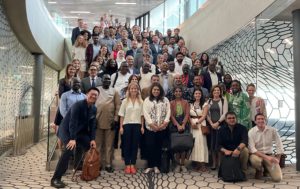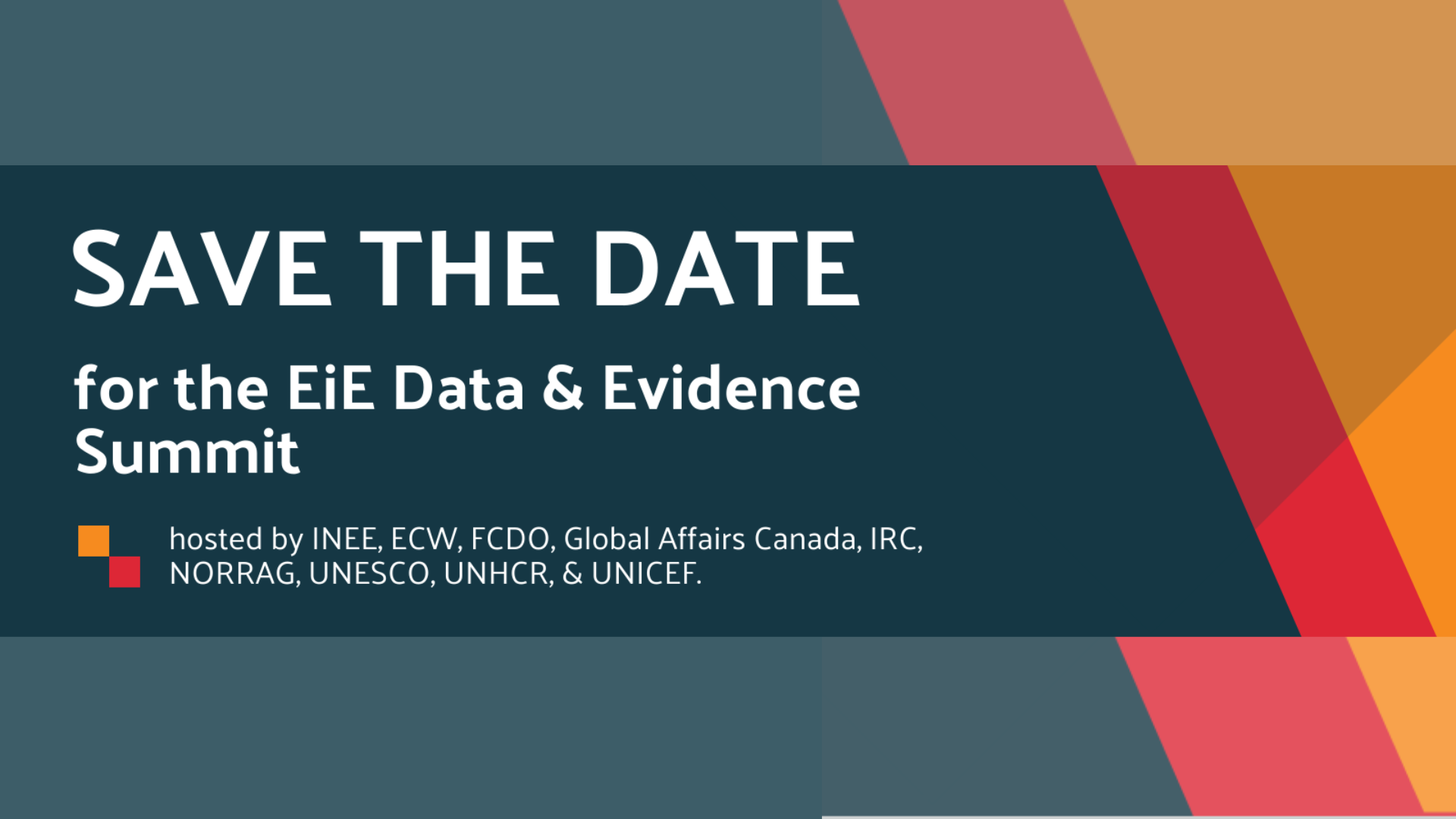Event Highlights: EiE Data & Evidence Summit, Geneva Switzerland - June 6-8
Note: The views expressed herein are those of one participating NORRAG speaker from the Global North, Daniel Shephard, and do not reflect the joint conclusions of the summit which are still being drafted.
Over the course of three days at the Geneva Graduate Institute, the 2023 EiE Data & Evidence Summit convened policymakers, practitioners, researchers, donors, data experts, and displaced youth. The 2023 Summit collectively expanded and reinvigorated an Action Agenda building on the work of the 2019 EiE Data Summit. INEE and NORRAG, two of the four co-organisers of the 2019 Summit (alongside SDC and USAID) came together again with a revitalised partnership, now including ECW, the Geneva Global Hub for Education in Emergencies, Global Affairs Canada, IRC, UK FCDO, UNESCO and UNHCR.
The 2023 Summit collectively expanded and reinvigorated an Action Agenda building on the work of the 2019 EiE Data Summit.
We still need to reiterate the multifaceted importance of education in emergency situations, and the need to strengthen national education systems so that learners and teachers can be integrated into those systems and realise their right to education and more. – Moira Faul, Executive Director, NORRAG (see the full welcome remarks below)
On the content side, the event brought together parallel streams of work on data and evidence, dedicated substantial time to discussing the ethics of data and evidence, and explored important questions of knowledge equity and the governance of data and research–with special attention to how data and research processes can better engage affected communities and local experts.

credits: INEE
The 2023 Summit also included a broader representation of EiE stakeholders compared to 2019. The expansion of participants was illustrated by the first moderated discussion that included perspectives from Armando Ali of the PAL Network’s citizen-led data collection in the Global South, from George Mogga of the Ministry of Education in South Sudan, as well as speakers located in the Global North ranging from Christian Stoff of Education Cannot Wait, Silvia Montoya of the UNESCO Institute of Statistics, and Randa Grob-Zakhary of Education.org. The increased participation of experts, practitioners, policymakers, and affected populations from the Global South is an important achievement of the event.
The summit was organized into working sessions where participants critically examined the progress made since 2019, the challenges that remain, and the way forward. Although the full event report and action agenda are not yet available (at the time of writing), several insights about adaptations needed to the EiE Data & Evidence Action Agenda were raised:
- The importance of data and evidence in EiE was highlighted by speakers from all organizational and geographic backgrounds. The breadth of the need was powerfully demonstrated by the presentation of new global estimate that there are 224 million conflict-affected children of school-going age of which only 11% are in school and achieving minimum proficiency levels in reading and math. However, discussions throughout the Summit underlined that data and evidence about population needs and effective policies are difficult to generate due to gaps in the data and evidence ecosystem.
- The importance of centering ethical partnerships in EiE data and evidence was highlighted eloquently in the keynote address by Francine Menashy of the University of Toronto on the opening day, and remained a topic that participants returned to throughout the event. Participants are continuing to explore how better guidance and accountability specific to ethical issues faced in EiE data and evidence production and use might be improved.
- The need to harmonize parallel initiatives that have proliferated across different institutions. Although coordination was highlighted in 2019 and the Data Working Group has improved coordination, there is need to do more as duplicative efforts continue. The broader participation of institutions at the 2023 Summit has generated renewed efforts to improve coordination to make better use of limited resources.
- The potential for citizen participation in data collection, evidence generation, and the use of data and evidence were highlighted throughout the summit. A number of promising examples and future plans were shared. For example, the PAL Network supports numerous citizen-led data collection activities plans to expand coverage of EiE contexts. The NORRAG initiative #TheSouthAlsoKnows was also presented as a way of supporting better knowledge equity and engagement of experts from the Global South–both researchers and practitioners.
- The 2019 Summit highlighted specific data gaps that remain a challenge These include limited data and evidence on EiE for internal displaced persons, those displaced by environmental disasters, teachers, and immediately affected “host” populations–a concept that remains poorly defined. While recent efforts have begun to address these gaps, much more work is needed in these areas of EiE.
- How to move from ideals to what is practically possible given limited and unstable resources was another common theme. Participants shared examples of lacking staff positions dedicated to EiE, data, and/or evidence; other participants shared concerns about the continued low levels of funding for education in humanitarian settings and how that limits the resources available for EiE Data and Evidence; others highlighted how funders have backtracked on commitments to EiE Data and Evidence in recent years thus jeopardizing progress to date.
These represent initial reflections of one participant. More importantly, all interested stakeholders should look forward to reading and reacting to the forthcoming 2023 Summit Report and Action Agenda which will be published by INEE. I am confident that we left the 2023 Data and Evidence Summit reenergized and refocused, and that we will continue to make progress together.
During the event, members from NORRAG and the Geneva Graduate Institute contributed to sessions as participants, speakers, and moderators. This included speaking and moderating sessions on knowledge equity, capacity sharing throughout the research cycle, internally displaced persons, and developing global public goods while respecting local contexts.
Welcome from Moira V. Faul, Executive Director, NORRAG and Senior Lecturer, Geneva Graduate Institute.
I’m so pleased to welcome you all to the Graduate Institute of International and Development Studies, Geneva for this exciting conference over the next three days. Welcome to Geneva for those of you who have travelled to be with us. And bienvenue chez nous here at the graduate institute
The Geneva Graduate Institute is a leading institution of research and higher education dedicated to the study of world affairs and located in the heart of International Geneva. NORRAG is an associated programme of the Institute and represents the Institute in all matters related to education.
We have some wonderful students helping out with the conference, so thank you to them!
Thank you first to Sonja Anderson, and also to the Institute and NORRAG events teams. And to all of the co-hosts, INEE, UNESCO, UNHCR, UNICEF, the IRC, Global Affairs Canada, Education Cannot Wait, the EiEGenevaHub And all of the speakers and participants, without whom we would not have the quality of discussion we are looking forward to over the next three days.
The genesis for this conference lies in the 2019 EiE Data Summit, also in Geneva, also co-hosted by NORRAG and INEE, but then with the Swiss Development Cooperation Agency and USAID.
The call then in the EiE Data & Evidence Action Agenda for improvements in quality, fit for purpose, and actionable data has been heeded, and in recent years the EiE data community has made tremendous progress in data collection and evidence use which has led to action on the ground.
We have moved so far since that conference just 4 years ago. But the complexity, number and duration of emergencies has also increased, as have the stressors that exacerbate these shocks (climate change, authoritarianism, and more). We still need to reiterate the multifaceted importance of education in emergency situations, and the need to strengthen national education systems so that learners and teachers can be integrated into those systems and realise their right to education and more.
This conference is an important moment to take stock of the enormous progress that has been made and also to recognise the ongoing challenges and further strengthen our capacity as actors involved in data collection and analysis by building flexible systems and new modes of respectful collaboration, particularly with the Global South, while acknowledging the non-neutrality of data collection, analysis and use.
This conference is all about collectively – with all of you – identifying trends, mechanisms, challenges as well as establishing pathways and action planning for future success.
Key words guiding our discussion over the next few days are:
- Ethics, equity, power dynamics
- Impactful, useful, relevant, coherent
- Equal partnerships in data collection and analysis and evidence generation and uptake
- For learning, for resilience, for knowledge equity
And also, crucially, building the next Action Agenda to take us to the next conference where I look forward to seeing you all again. Do enjoy the next three days – I know I will!

